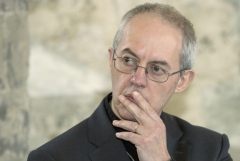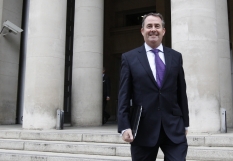When Julius Caesar crossed the Rubicon in 49 BC, it changed the course of history. The future shape of the Roman Empire, and therefore the world, depended on whether Caesar would press on over the river. He did, and the rest, as they say, is history.
Why, then, did the Archbishop of Canterbury use this image to describe a private member's bill which will be debated in the House of Commons this week? The answer is simple – whether you agree with assisted suicide or not (and let's call it what it is, suicide, not the more sanitised word, dying) this is a milestone moment.
If Parliament allows doctors to assist in their patients killing themselves, a line will have been crossed in British society. It's far from a straightforward issue. There are heart-rending stories of suffering that we wouldn't wish on anyone. There are powerful, if anecdotal, arguments in favour of relaxing the law. But here are five reasons MPs must vote against a change, and in doing so turn back from the Rubicon...
1. Doctors don't want it
The people who would be expected to administer a lethal dose of drugs to a patient, if assisted suicide became legal, don't want to do it. The British Medical Association, which is the umbrella body representing doctors in the UK, has repeatedly stated its opposition to any change in the law.
Key argument – BMA: "Such a change would be contrary to the ethics of clinical practice, as the principal purpose of medicine is to improve patients' quality of life, not to foreshorten it."
2. Disabled people don't want it
Some of the most strident opposition to the bill has come from disabled activists and commentators. Baroness Tanni Grey-Thompson is one of the most high-profile opponents of assisted suicide. Large charities such as Scope and smaller activist networks like DPAC are calling for MPs to vote no to a change.
Key argument – DPAC: "We want support to live not die. At a time when essential support is being taken away from us... it is more dangerous than ever to introduce legislation which encourages suicide as a solution to the barriers Disabled people face."
3. Parliament doesn't want it
There have been numerous attempts to liberalise the law already. Lord Falconer has devoted the last few years to attempting to change it, but he has been constantly thwarted by measured arguments. Proponents of assisted suicide are now trying the House of Commons. MPs on all sides have argued against a change in legislation.
Key Argument – Lord Winston: "We see the increasing difficulties in the health service when dealing with cancer care at the moment and the provision of drugs. "There will be pressures on budgets and increasing pressures on patients who will feel under pressure to take a decision [to kill themselves] that is not entirely theirs."
4. Christian leaders don't want it
Some of the strongest and most cogent arguments against a change in the law have come from Christian leaders. The Archbishop of Canterbury Justin Welby has made a powerful case against liberalising the law, while standing alongside leaders of other faiths including Muslims, Jews and Sikhs.
Key argument – Welby: "How can we be absolutely certain that individuals will not be put under considerable pressure to end their lives?... How can we be absolutely sure that a 'right to die' will not eventually become a 'duty to die'?"
5. We've been warned where it ends up
We're not making this decision in a vacuum. Several US states have legalised euthanasia and European countries have been having the same debate. Belgium is the furthest down the road. You can read various reports of where that has ended up (physically healthy 24-year-olds being granted assisted suicide, for example).
Key argument – Catholic Herald: "Between 2009 and 2013, annual deaths more than doubled from 822 to 1,803. One study even concluded that euthanasia is under-reported by approximately 50 per cent and that 1,000 patients a year have their lives ended without an explicit request."


















